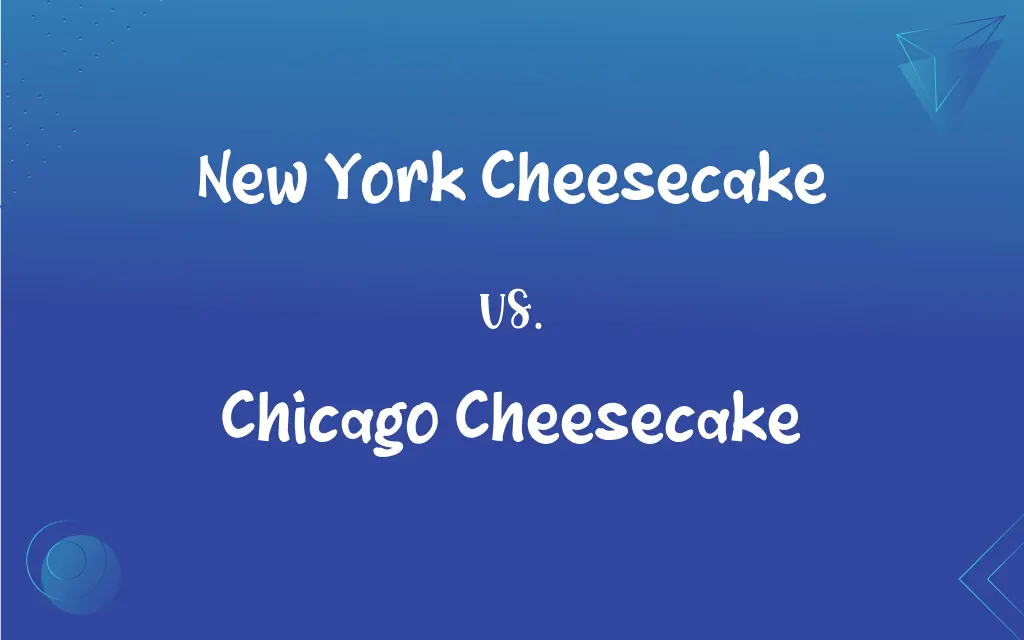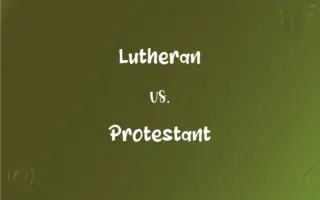New York Cheesecake vs. Chicago Cheesecake: What's the Difference?
Edited by Aimie Carlson || By Janet White || Published on January 30, 2024
New York Cheesecake is dense, rich, smooth, and creamy, often made with heavy cream or sour cream. Chicago Cheesecake is fluffy, airy, often incorporating whipped cream or whipped egg whites.

Key Differences
New York cheesecake is known for its dense and smooth texture, primarily due to the use of cream cheese, heavy cream, or sour cream. In contrast, Chicago cheesecake often includes whipped cream or whipped egg whites, giving it a lighter and fluffier texture.
The crust of a New York cheesecake is typically a simple graham cracker base, providing a firm foundation. Chicago cheesecake may feature a more varied crust, sometimes even opting for a sponge cake base, which complements its airy consistency.
New York cheesecake often embraces simplicity, focusing on the rich flavor of the cheese. Chicago cheesecake, on the other hand, might experiment more with toppings and mix-ins, such as fruit swirls or chocolate chips.
When served, New York cheesecake is usually thick and tall, emphasizing its richness. Chicago cheesecake tends to be shorter and may have a more delicate presentation due to its lighter texture.
Both styles reflect their city's culinary heritage. New York cheesecake is a nod to the classic, straightforward American dessert style, while Chicago cheesecake represents the city's love for innovation and diversity in its food culture.
ADVERTISEMENT
Comparison Chart
Texture
Dense and creamy
Light and fluffy
Crust
Typically graham cracker
Varied, sometimes sponge cake
Main Ingredients
Cream cheese, heavy cream/sour cream
Cream cheese, whipped cream/egg whites
Toppings/Flavors
Simple, often plain
More diverse, like fruit or chocolate
Serving Thickness
Thicker slices
Thinner, more delicate slices
ADVERTISEMENT
New York Cheesecake and Chicago Cheesecake Definitions
New York Cheesecake
A dense, rich cheesecake known for its smooth texture and creamy taste.
I savored every bite of the classic New York cheesecake at the bakery.
Chicago Cheesecake
Features whipped cream or egg whites for a lighter texture.
The whipped egg whites in the Chicago cheesecake made it exceptionally fluffy.
New York Cheesecake
Often served plain or with simple toppings like fruit or chocolate.
The New York cheesecake was adorned with just a few fresh strawberries.
Chicago Cheesecake
Known for its diverse and innovative toppings and flavors.
The chocolate swirls in the Chicago cheesecake added a delightful twist.
New York Cheesecake
Commonly features a graham cracker crust as its base.
The graham cracker crust added a delightful crunch to the New York cheesecake.
Chicago Cheesecake
A light, fluffy cheesecake often incorporating whipped ingredients.
The airy Chicago cheesecake was like a cloud of creamy goodness.
New York Cheesecake
Notable for its tall, thick slices, emphasizing its richness.
The tall, thick slice of New York cheesecake was a perfect end to the meal.
Chicago Cheesecake
Served in thinner slices, emphasizing its airy quality.
Each delicate slice of Chicago cheesecake was a masterpiece of lightness.
New York Cheesecake
Characterized by the use of heavy cream or sour cream for a richer flavor.
The heavy cream in this New York cheesecake makes it exceptionally luxurious.
Chicago Cheesecake
May have a unique crust, like a sponge cake base.
The sponge cake crust of the Chicago cheesecake was a pleasant surprise.
FAQs
What distinguishes New York cheesecake linguistically?
It often implies a dense, rich texture, symbolizing indulgence and classic taste.
Are these terms regional in use?
Yes, they are often used to describe regional variations of cheesecake in the U.S.
Can 'New York cheesecake' imply sophistication in language?
Yes, it can connote a sense of classic sophistication and traditional quality.
How is Chicago cheesecake represented in language?
It conveys lightness and innovation, often suggesting a creative twist in recipes.
Are these terms used metaphorically?
Rarely. They are primarily used in a literal sense to describe cheesecake styles.
Why is 'New York' used in 'New York cheesecake'?
It indicates the style's origin and association with the city's culinary heritage.
Can these terms be confusing for non-locals?
Potentially, as the specific regional references may not be universally known.
What does 'Chicago' signify in 'Chicago cheesecake'?
It reflects the city's influence on this particular airy and fluffy style of cheesecake.
Do these terms appear in culinary education?
Yes, they are used in culinary arts to teach about regional dessert variations.
Does 'Chicago cheesecake' suggest innovation in language?
Absolutely, it often implies culinary creativity and a lighter, modern approach.
How do these terms impact culinary language?
They contribute to the diverse culinary lexicon, representing regional dessert variations.
How do these terms influence food culture dialogue?
They highlight regional culinary preferences and contribute to discussions on dessert variations.
Is 'New York cheesecake' used in advertising?
Yes, often to denote a classic, rich, and indulgent dessert option.
How have these terms evolved over time?
They've grown from regional descriptors to widely recognized terms in the culinary world.
Do these cheesecake terms influence consumer expectations?
Yes, they set specific expectations about texture, ingredients, and taste.
Do these terms appear in international culinary contexts?
Yes, they are used globally to describe American-style cheesecake variations.
Can understanding these terms enhance culinary experiences?
Absolutely, knowing the differences can enhance appreciation and choice in dessert selection.
How are these terms used in recipe books?
As descriptors to guide readers on the style and characteristics of the cheesecake.
How is 'Chicago cheesecake' perceived in marketing?
It's marketed as a lighter, more innovative dessert choice.
Are there any common misconceptions about these terms?
Some may assume the terms imply origin, but they primarily refer to style and recipe.
About Author
Written by
Janet WhiteJanet White has been an esteemed writer and blogger for Difference Wiki. Holding a Master's degree in Science and Medical Journalism from the prestigious Boston University, she has consistently demonstrated her expertise and passion for her field. When she's not immersed in her work, Janet relishes her time exercising, delving into a good book, and cherishing moments with friends and family.
Edited by
Aimie CarlsonAimie Carlson, holding a master's degree in English literature, is a fervent English language enthusiast. She lends her writing talents to Difference Wiki, a prominent website that specializes in comparisons, offering readers insightful analyses that both captivate and inform.







































































